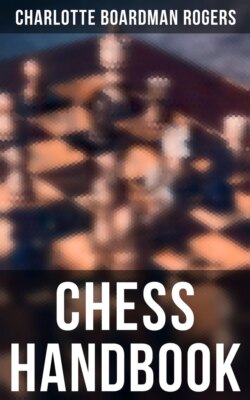Читать книгу Chess Handbook - Charlotte Boardman Rogers - Страница 4
На сайте Литреса книга снята с продажи.
CHAPTER I
INTRODUCTION
ОглавлениеTable of Contents
The game of Chess originated in India about five thousand years ago and is the oldest and most scientific game of a sedentary character. The name comes from the Persian shah, or King which is the name of the principal Piece and upon whose capture the fate of the game depends.
The history of Chess is extremely interesting as people of all nations, famous in all professions, have given it careful attention and study. From its origin in India, its popularity spread Eastward to China and Japan; and then Westward, through Persia and Bysantium to Europe where, during the Middle Ages, it became the favorite pastime of the cloister and the court. In this connection it is worthy of note that Chess is the only game of the kind that has always been approved by the priesthood of all faiths; Catholic, Protestant, Buddhist, and Moslem. In Philidor's day, during the first half of the Eighteenth Century, it was the custom in Europe for the musicians at the royal chapels to amuse themselves with Chess when their services were not required during High Mass; and it was for this reason that the name of Philidor has lived in the history of Chess rather than in the history of music, for he was a great musician as well as a remarkably skilled Chess player.
Since the invention of the game, five thousand years ago, its development may be said to have undergone three distinct periods. The first lasted until about 600 A. D., and during that time it was played by four persons, the move of each Chessman being about the same as it is now, but a dice was thrown to decide which one was to be played. The second period lasted from the Seventh to the Sixteenth Century, during which time the game was reduced to a contest between two persons. The element of chance was also done away with, and the dice discarded. The third and last stage in the development of the game began at the close of the Sixteenth Century and continues until and during the present day.
During the last century, Chess periodicals were introduced and public contests were established between famous players or between the different clubs. Chess assemblies, tournaments, and contests for amateurs were also first held in the Nineteenth Century which added greatly to the interest and general popularity of the game. To-day, even the daily newspapers give space to the subject, recording the moves in match tournament games so that a person may follow each play by reading his paper just as readily as if he were an eye-witness of the game.
In connection with the study of the game, it is interesting to know that among its devotees have been such monarchs as Charles XII., Napoleon I., Frederick the Great, Charlemagne, and Haroun al-Rashid; and such philosophers as Voltaire, Rosseau and Franklin.
The literature of the game has been contributed to by writers of all nations and, while the student cannot be expected to become familiar with all that has been written on the subject, he should know, at least, the names which are most prominent in connection with the scientific development of Chess. Among them are: Hanstein, Von der Lasa, Lange, and Harwitz, of Germany; Cunningham, Janssen, Sarratt, M'Donnell, and Staunton, of England; Petroff and Kieseritzky, of Russia; Szén and Lowenthal, of Hungary; Stein, of Holland; Stamma, of Syria; Philidor, Deschappelles, and La Bourdeunais, of France; Ruy Lopez and Xerone, of Spain; Dubois, Salvio, Paoli Boi and Del Rio, of Italy; and Morphy of the United States. The East, where the game originated, has also contributed to its literature and the Asiatic names associated with it are: Sokeiker, Rhazes, Suli, Damiri, Ibn Sherf Mohammed, Ghulam Kassim and All Shatranji.
While Chess is a purely scientific form of amusement, and one that requires constant practice and study, if a player desires to become skilled, it affords such pleasure to those who are among its devotees and offers such exceptional opportunities for mental development that no person of culture can afford to neglect it. Of course, the scope of the present volume only permits a survey of the general principles and laws of the game but the compiler has endeavored to give the student a thorough groundwork for ordinary purposes; but for the benefit of those who wish to go into the minutest details of the most scientific play, a Bibliography has been prepared to which the student is referred after he has mastered the contents of the present work.
